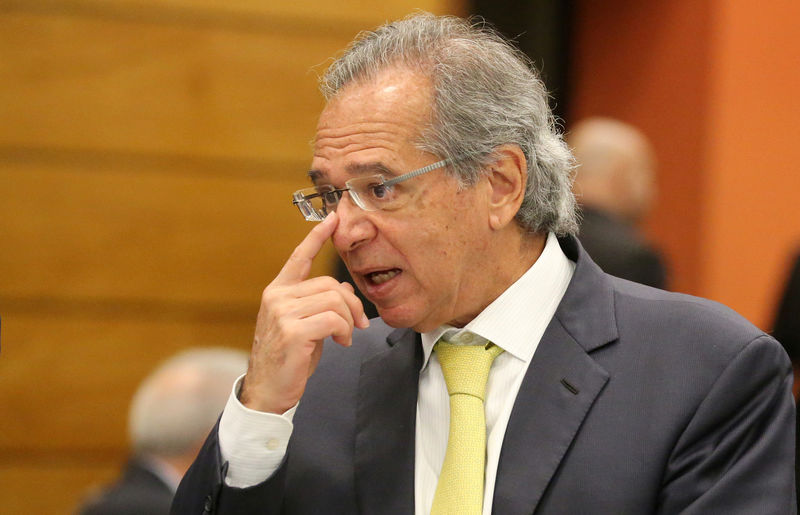 © Reuters. FILE PHOTO: Economist Guedes is seen before a lunch between businessmen and Federal deputy Bolsonaro a candidate for the Presidency of the Republic for the PSL at the FIRJAN HQ in Rio de Janeiro
© Reuters. FILE PHOTO: Economist Guedes is seen before a lunch between businessmen and Federal deputy Bolsonaro a candidate for the Presidency of the Republic for the PSL at the FIRJAN HQ in Rio de JaneiroBy Marcela Ayres
BRASILIA (Reuters) – After making his fortune with contrarian bets in financial markets, Brazilian economist and investor Paulo Guedes is making his boldest wager yet.
He says presidential front-runner Jair Bolsonaro – who spent decades as a congressman fighting to raise public-sector pay and railing against privatizations – will usher in a golden age of orthodox, market-friendly policy if he wins Sunday’s election.
The two have known each other for less than a year.
Yet that has been enough to make 69-year-old Guedes one of Bolsonaro’s most trusted advisers and a proposed “super minister” in his administration for all economic matters.
Guedes, a fund manager and former professor, says he has steered ex-Army captain Bolsonaro away from the state-led industrial model of the nation’s 1964-1985 military government. Pharaonic infrastructure projects helped stoke growth during the period but ultimately fed an explosion of public debt and hyperinflation.
Now Bolsonaro, an enduring fan of the dictatorship, says he favors slashing pensions and selling state companies as part of an effort to shrink Brazil’s government. On the campaign trail, he has repeatedly shrugged off detailed questions about the economy, saying he would do as Guedes suggested.
That prospect has thrilled investors, who sent Brazil’s stocks and currency soaring as Bolsonaro built a huge lead over leftist rival Fernando Haddad ahead of a run-off vote on Sunday.
Guedes argues that the pugnacious Bolsonaro is just the man to deliver Brazil a jolt of free-market medicine and move past the current center-left policy consensus that has seen Brazil lurch from crisis to crisis.
As a co-founder of a Brazilian investment bank that grew into Banco BTG Pactual SA
“I joke that Jair is learning much faster than the lot of them, even though he likes to skip class so he can chase votes,” Guedes told participants at an event in Brasilia in August.
Guedes has a doctorate from the University of Chicago and experience teaching at some of Brazil’s most prestigious schools, along with the University of Chile during the reign of General Agosto Pinochet, and few question his orthodox credentials.
Bolsonaro has vowed to give him free reign over a new ministry combining the responsibilities of the finance, planning and trade ministries.
Pressed in a recent TV interview on who else could fill that role if Guedes left his administration, Bolsonaro compared their relationship to a marriage.
“There is no Plan B,” he said.
Yet skeptics warn that a single adviser will have a tough time reining in the mercurial Bolsonaro, whose embrace of free-market economics runs hot and cold.
For example, Bolsonaro has opposed the sale of state-run power generation assets, just as he fought the privatization of iron ore miner Vale SA (SA:) two decades ago.
Alexandre Schwartsman, former director of Brazil’s central bank, says without Bolsonaro openly defending market-friendly proposals on the campaign trail, there is no way to be sure that Guedes will be allowed to implement them.
“It seems like people are believing a fairy tale,” he said. “The personal beliefs of Bolsonaro do not align with such a program … I’m not sure whether it’s naive or cynical.”
PUBLICLY AT ODDS
Indeed, the campaign has exposed deep fault lines between Guedes, Bolsonaro and other members of his team.
Guedes has proposed privatizing state oil company Petroleo Brasileiro SA (SA:) and state lender Banco do Brasil SA (SA:). Retired General Oswaldo Ferreira, however, also a minister in waiting, said those firms would stay state-run for “strategic” reasons.
Guedes called for swift approval of a pension reform along the lines proposed by President Michel Temer. But Congressman Onyx Lorenzoni, Bolsonaro’s proposed chief of staff, rejected any such move this year, calling Temer’s proposal “awful.”
When Guedes floated the idea of a financial transaction tax, similar to an unpopular tariff known as the CPMF, Bolsonaro himself said the economist had made a mistake.
As the contradictions have mounted, Guedes has gone quiet, cancelling press interviews and public appearances.
He has kept an especially low profile since prosecutors this month said they were looking into possible mismanagement of public pension fund money in one of his investment vehicles.
Guedes and the pension fund have denied any wrongdoing.
Guedes declined an interview request.
Acquaintances speculate openly about how a former academic with no government experience will handle the daily grind of Brazilian politics.
Ricardo Faria, a fund manager at RCF Capital, raised the concern in meetings with Guedes organized by investment banks.
“Our only question was whether Paulo was truly engaged with the project. I asked him myself two times: Paulo, are you going to have the patience?”
“He said, ‘Undoubtedly,'” Faria recalled. “After 24 years of social democracy, he said Brazil is ready to drop that legacy and try four years of the liberal right. So he is determined to help.”
The tougher task may be convincing hundreds of lawmakers to trim Brazil’s social security system and slash a federal budget that they rely on for pork barrel spending.
“What’s important is not just the market’s approval; it’s convincing Congress. The major challenge is political,” said Guilherme Afif, a former vice governor of Sao Paulo, who ran for president in 1989 with an economic program designed by Guedes.
“One sparrow doesn’t make it summer,” he added.
Source: Investing.com




























